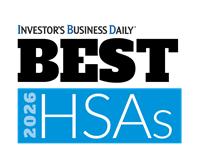1. With respect to federal taxation only. Contributions, investment earnings, and distributions may or may not be subject to state taxation.
2. There are zero account fees and zero account minimums for Fidelity HSAs
® offered through Fidelity.com to individuals and employers. There may be commissions, interest charges, and other expenses associated with transacting or holding specific investments (e.g., mutual funds), or selecting certain account features or types (e.g., managed accounts). When a Fidelity HSA
® is offered as part of an employer’s benefits package (which occurs through NetBenefits
®), Fidelity charges the employer a recordkeeping fee. This is a common fee charged by HSA providers. This fee may be up to $48/year, but it could be reduced or waived depending on the HSA balance. Employers may pass this fee on to their employees. Contact the employer for more information. Accounts that have been opened through, or are serviced by, an intermediary, or in connection with your workplace benefits, may incur additional fees or restrictions. Account minimums may apply to certain investments, including the purchase of some Fidelity mutual funds that have a minimum investment requirement. If you choose to invest in mutual funds, underlying fund expenses still apply. For more information and details, see the fund's prospectus and/or
www.fidelity.com/commissions.
3. Contributions to an HSA may be excluded from taxable income when they are made through payroll deductions as part of a cafeteria plan. Visit IRS.gov for additional information and discuss with your tax advisor.
4. Morningstar rated 10-11 retail HSA providers for two distinct use cases: HSAs as a spending account to cover current medical costs and HSAs as an investment account to save for the long term. Results published in 2019, 2020, 2021, 2022, 2023, 2024, and 2025 Health Savings Account Landscape.
5. Investor's Business Daily identified "Best HSA For 2026" based on fees, account features, investing options, and savings rates, as of November 14, 2025.
The information provided herein is general in nature. It is not intended, nor should it be construed, as legal or tax advice. Because the administration of an HSA is a taxpayer responsibility, you are strongly encouraged to consult your tax advisor before opening an HSA. You are also encouraged to review information available from the Internal Revenue Service (IRS) for taxpayers, which can be found on the IRS website at IRS.gov. You can find IRS Publication 969, Health Savings Accounts and Other Tax-Favored Health Plans, and IRS Publication 502, Medical and Dental Expenses, online, or you can call the IRS to request a copy of each at 800-829-3676.
Investing involves risk, including risk of loss.
Fidelity Brokerage Services LLC, Member NYSE, SIPC, 900 Salem Street, Smithfield, RI 02917






